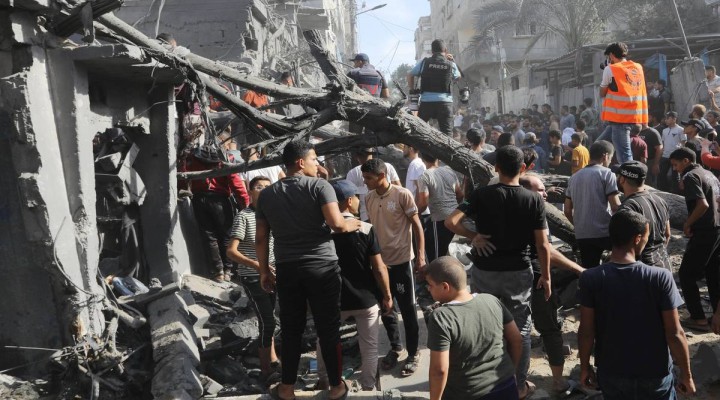Humanitarian relief for Palestinians is a diplomatic game at the UN

While Israel has certainly damaged its security narrative with its grotesque display of colonial violence in Gaza, the international community prefers to walk its own duplicitous road. Recently, 120 countries voted in favour of a UN General Assembly Resolution calling for a humanitarian truce in Gaza. Unsurprisingly, the US was one of 14 countries that voted against the resolution. Another 45 countries, including Australia, abstained. Both the US and Australia referred to Israel’s narrative regarding Hamas as the reason for opposing the resolution.
Of the countries voting in favour, it must be said that the humanitarian paradigm provides a safe diplomatic venture that does not draw undue attention to Israel’s colonial violence. While humanitarian aid is an unequivocal necessity for all Palestinians in Gaza, the humanitarian paradigm encourages Israeli colonial violence because it knows that the international community will step in to alleviate — albeit temporarily — the repercussions of Israel’s relentless bombing. There is no deterrent for Israel, only the certainty that, after a pause, assuming Israel agrees to it, the bombing can continue for the benefit of further colonial expansion.
“We know there is no humanitarian crisis in accordance with international humanitarian law,” Israel’s Ambassador to the UN Gilad Erdan lashed out while blaming Hamas, in an effort to shift attention away from the root problem, which is the Zionist colonisation of Palestine.
The US and Australia, both founded upon colonial violence and ethnic cleansing, explained their decisions by relying on the Israeli narrative. The resolution did not mention Hamas, hence their opposition. In the colonial narrative, therefore, humanitarian aid should be accessible to Palestinians only if linked to the Israeli narrative on Hamas.
“We abstained with disappointment because we believe the resolution, as drafted, was incomplete,” Australia’s UN Representative James Larsen stated. “The resolution did not recognise the terror group Hamas as a perpetrator of the 7 October attack, and Australia again calls for the immediate and unconditional release of hostages.”
Australia had voted in favour of an amendment to the resolution proposed by the US and Canada that would have referenced Hamas. Why, though, should the General Assembly resolution focus on Hamas when Israel’s target is the whole Palestinian population of Gaza?
If the US and Canada, as well as Australia, are truly concerned about the hostages taken by Hamas, why is there no condemnation of Israel’s reluctance to save its settler-colonists, who are as much in danger of being killed by Israeli forces at the moment as Palestinians living in Gaza are?
The humanitarian paradigm as presented by the UN is farcical, in a macabre way.
Today’s report from the UN on the situation in Gaza illustrates the immediate necessity of humanitarian aid. At the UN, humanitarian aid is just a concept discussed from comfortable venues in complete dissociation from the realities of the deprivation resulting from Israel’s colonial violence. The comfort from which representatives at the UN speak of humanitarian aid, whether in favour or against, is merely an abstract that exploits millions of the lives which are at stake.
The UN needs to address this discrepancy. It is abominable that UN reports illustrate the urgency of humanitarian relief while, simultaneously, such relief is debated and subject to Israel’s refusal to at least acquiesce to its delivery, not to mention the diplomatic hindrance caused by Israel’s global allies, absurdly and allegedly in the name of human rights. If the UN does not deliver humanitarian aid, and if the countries that voted in favour of the resolution do not clamour for its delivery until it happens, then each and every UN member state is validating Erdan’s colonial narrative.
https://www.middleeastmonitor.com/20231102-humanitarian-relief-for-palestinians-is-a-diplomatic-game-at-the-un/
 TheAltWorld
TheAltWorld 
0 thoughts on “Humanitarian relief for Palestinians is a diplomatic game at the UN”